Allison Hurd's Blog, page 7
October 14, 2018
Well, We Found THIS At Least
Writing is work. Artistic work is real work. All kinds. Like with your day job or volunteer work, sometimes you wake up motivated, inspired, and ready for a full day of progress and achievement. But most of the time, Facebook seems way more interesting than whatever is on the to-do list. But that’s not an excuse from the work, merely a distraction. Artistic work is the same. When I was a jeweler, it didn’t matter if I was tired making this certain design, that was what made me money. When I edit books, it doesn’t matter if they’re books I’d personally read for enjoyment or not, this is what I’ve committed to providing. And the same goes with writing.
So, I know I’m late with the third book. I am sorry. I have lots of good, valid reasons why I was slowed down, but none of them were the seriousness with which I approach my creative endeavors.
Here is my three step program to getting back into writing when inspiration has been smothered in its bed:
Just write. Even if you know you’ll delete it all and rewrite it in edits, get something down.
Find that one thing you researched and totally forgot to link. Did you find it yet? No? KEEP LOOKING!! Demand the internet/library gives up its secrets. Perhaps divert some amount of time to learning magic in the hopes that it will help reveal to you that thing you lost. Did the magic work? Maybe! Who knows? But that article is super important, do please find it.
No excuses. Write words. Hell, write words in the wrong language. Just make that wordcount go up. That is your job.
If you don’t wanna, and you don’t, then it’s not a job. It’s a hobby. It’s a pastime. It’s a phase you went through. Keep. Fathermugging. Writing.
And for the love of God, where did I put that one resource I was citing!

PS. Pay artists.
PPS. Hire artists.
PPPS. If you don’t want to pay artists, I challenge you to go a whole day without reading anything, looking at any art, watching any media or listening to any music or pod/newscasts. If you just about crawl out of your skin without stimulus, at least contribute to a Patreon or buy a subscription to something! We need art to thrive!
October 7, 2018
Only Good Things Here Pt. 2
It’s been a tough time. Here’s what’s getting me through these days.
A Harry Potter Party
I made Sorting Hat cupcakes! There was a Dementor shooting gallery, a Hogwarts cake and butterbeer! There were potions! Along with great company, which really was the best part.




Photos courtesy of A. DeKorte
These Things

Look at them!
Reading
I’ve read 55 books so far this year. I’ve found some great ones. And learned a lot from both the good and the awful along the way. (Join me on Goodreads!)
Havening
When I get wound up, I use this technique. It’s worked pretty well for me. Ignore the synth music and the sales pitch. It’s really just a grounding technique that’s a bit more involved than the 5 Senses technique and its ilk for really bad moments of anxiety.
Exercise

Release endorphins. Feel yourself get stronger. Make friends who encourage you and believe in your progress. Learn to appreciate lying down in all its forms and locales.
Miss Phryne Fisher
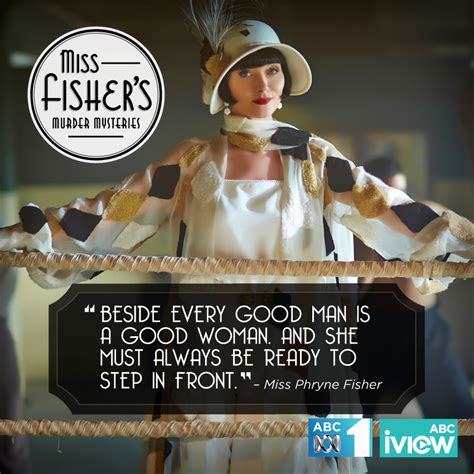
Impeccably costumed, gorgeous Australian people solve mysteries in the roaring 20s. Funny, sexy, feminist, and delightful.
And remember that there’s always hope as long as those who hope are ready to be those who do.
What are you doing to take care of yourself?
September 30, 2018
Only Good Things Here
This post is full of good things only. I think we need some of that.
First of all, I like you. I think you’re great. I know you’ve got a lot going on and you’re doing it beautifully. You are good. You are worthy. You will do the thing!
A Disgusting Love Story
My boy cat, Ellis, gets horribly car sick. We found this out with four adults and both cats in the car on the way to my parents’ house in preparation for our wedding. We did our best, for him–kitty happy pills, a bathroom break, and most importantly, both cats in one carrier. We thought, what with the bodily fluids all over the place, the incessant mewling, and his ongoing anxiety attack, that Lily–a former feral cat–might resent her brother and eventually try to do something about it.
And eventually she did. Covered in bile and drool, she grabbed her brother’s scruff and gently licked his face, purring while she cleaned him the last ten miles of the trip.


Madam of Honor Speech
This is the speech I gave at my sister’s wedding:
Hello all, thank you so much for being here today. I am Allison, and as you may have determined with your crack detective work, I am Joanna’s sister. She’s the younger one, thank you for asking! Though we are sisters, there have always been a few things that were distinctly our own. Joanna is kind, and fun, and genuine, always. She also hates when I talk about her.
Then there are the things in which we are defined by our opposing strengths and weaknesses. She loves coconut. I’m not sure why we eat them. Her paint night paintings look like she stole the original, mine look like I painted it with my toes. And when I say farewell to someone in broad daylight I opt for the traditional “goodbye” while Joanna mixes it up a little with “good night.”
And then there are the traits we both share. My family tends to love quickly and deeply and so it wasn’t a surprise when she too fell in love with her first serious boyfriend, and married him. It wasn’t terribly surprising that she too picked someone from Massachusetts, but it was definitely a happy coincidence that she found someone who was also my long time friend. I’ve known Matt almost half my life now, and I don’t think I could have asked for a better partner for my little sister. So you see, while all weddings are occasions of joy, this one is extra special. Today, I get to witness two of my best friends marrying their best friends, and I’m not sure I can contain any more happiness for them than I do right now. So, congratulations, Matt and J, here’s to a lifetime of perfect bliss.
[image error]
An excerpt from Sacrifice
“Just once, just once I’d like to be able to make a plan, execute it, and roll out like big shots.”
“And I would just like a shot,” Lia says with a little smile. “Come on. This is kind of funny. Like…is this not what you picture when you think ‘li’in awn tuh bayou?’ ” she drawls with a decent impression of the local “dat” accent.
I sigh. “Well, then Cthulhu should rise any second, if it’s supposed to look how it looks in my head.”
“Pessimism ages you, Summer. We’re winners. Let me see your winner smile.”
I shake my head at her as I regard the death trap masquerading as a dwelling. “I’m going in fully loaded. If we need to cross that threshold, I’m going to be ghost repellant. And witch proof. And toxic to humans.”
“Oh good, so you’ll be lovely in confined spaces, is what you’re saying.”
That makes me laugh, despite my mood.
“You won’t be able to smell me over your own stink. I am not battling a Loch Ness monster to save you because you didn’t wanna smell like garlic.”
“Summer, do we need to have a talk about your prepper nature again?” Lia asks with mock condescension.
“We do not,” I say loftily.
“So, then you’re actually going to leave most of this here, right?”
“I am not,” I say in the same tone.
I don’t have a picture for this, so enjoy this bird, who is living its best life.

Have a laugh, have a cry, and have, above all else, a great week!
September 23, 2018
None With Better Natural Taste
Sometimes, when the news is full of Cthulhu-level madness and your mentions are full of trolls, you need to go and do something just for yourself. And when you’re me, that might involve dancing to music about Satan, slavery, and the reasonable fear of imminent death.
Please see my previous post and its reminder that some people juggle geese.
I will agree that this is not relaxing. I know only one way to relax, and it requires a chaise lounge, a cup of coffee, and a good book. But relaxing doesn’t, as the kids say, help to “shake it off.” For that, we have music.
I happened to catch Zeal and Ardor this past week, and I have to say, they’re worth checking out. Their latest album, Stranger Fruit, is based on the concept of exploring American slavery. With a stunning combination of Southern blues, R&B tonality and black metal, the band encourages the audience to share in the heartbreak, grief, and fury that comes with the legacy of oppression, and then reclaims their own power to address that now, with all of us fighting together. Heavy bass lines you can feel in your chest, and sound so full it’ll raise the hair on your arms works to draw you bodily into the music while haunting lyrics focus your movement on the act of revolution.

It was absolutely stunning, a perfect blend of things you want to rock out to and things you want to fix–form and function blending with all these unlikely genres to something unique and yet universal. There really is nothing like hearing a Black man rise from Louisiana-style blues to screaming metal while chanting the words
“These are the eyes that saw them die
These are the hands that dug their graves
So don’t let anybody tell you that you’re safe.”
(You Ain’t Coming Back)
In this era of Black Lives Matter, the poignancy of this message is keenly felt. But Zeal and Ardor isn’t preaching (well, unless you’re looking to join a Satanic church, then yes, sermons start at 10 am). They just encourage us to join in, to mobilize, to come together, dance, think, and promise we won’t make false promises of safety. Insomuch as the songs were about the horrors of enslavement, the music focused more on the right of self-determination and the power of freedom.
I definitely recommend giving them a listen if you’re a fan of blues, metal, punk, or related genres. I’ve never heard anything like it.
Their music can also be found in my Summoner Sisters read-along playlist. As you’ve maybe noticed, music is a Big Deal to me and I’d love to share the sounds that motivate and inspire me! And maybe you can tell me what you think would work well with the playlist or the books! New music is best music. Bring it. Unless it’s disco, because I said music, not crimes. (FIGHT ME!)

“There are few people in England, I suppose, who have more true enjoyment of music than myself, or a better natural taste.” (Pride and Prejudice)
Also, please remember that if you sign up for my newsletter, you can get my short story free! And Feeding Frenzy is still on Kindle Unlimited (but not for much longer!) Get ’em while you can!
September 16, 2018
But Things Were Different Then
“Things were different then.”
It’s amazing how much there is to unpack in such a small, vague sentence. It seems impossible to me that these words can say so much when they say nothing. But they’re used often when we’re talking about fiction, and they speak volumes.
Things were different. This implies that in the work of fiction we’re reading, we can see the progress of a society from what they were to how they are now, when this book is taking place. That we as readers can see the growth of a civilization. I always love when an imaginary world is so fully realized that I can reflect upon its societal changes throughout the course of a book, don’t you?
Of course, folks don’t mean the fictional world was different, they mean the imagined life of a period in Earth’s past comparable to that world–particularly medieval western Europe. We have a bizarrely strong, consistent mass delusion about life in medieval/Tudor/Renaissance time periods that provides a fascinating look at how mythologies get made. We’ve dreamed up our own mythical retelling of our history, and use this to compare with “imaginary” worlds, which is just such a beautifully convoluted thing.
I’ll talk about that more in a minute. The other element of this vague sentence is that it’s never about the lack of air conditioning or the intricate dances everyone seemed to know even though the musicians didn’t actually say anything about when to wibble and subsequently wobble, or when to cha-cha real smooth. No, it’s always about misogyny, power structures, abuse.
That’s fascinating to me. One, I’m led to believe that actually most people got a lesson pretty early on on not stealing, abusing, or raping folks. Several millenia old documents feature this pretty heavily.  So, even if definitions change a bit, the overall concepts weren’t, I think, wholly unknown. Surely it’d come up once or twice. I have a hard time imagining a parent looking at a 12 year old and saying “you’re not getting any younger. I’m 24, I need grandkids.” Even in cultures that really highlight the “coming of age” as young as 12, such as in Judaism, bar mitzvah isn’t the conference of full adulthood. Indeed, though bar mitzvah generally takes place at 13, the Talmud says that marriage is appropriate between ages 16-24, (or 18, depending on interpretation). So, adulthood and puberty have been separated for much longer than our kinder, gentler modern era.
So, even if definitions change a bit, the overall concepts weren’t, I think, wholly unknown. Surely it’d come up once or twice. I have a hard time imagining a parent looking at a 12 year old and saying “you’re not getting any younger. I’m 24, I need grandkids.” Even in cultures that really highlight the “coming of age” as young as 12, such as in Judaism, bar mitzvah isn’t the conference of full adulthood. Indeed, though bar mitzvah generally takes place at 13, the Talmud says that marriage is appropriate between ages 16-24, (or 18, depending on interpretation). So, adulthood and puberty have been separated for much longer than our kinder, gentler modern era.
But more than that, in genre fiction, it’s all made up. I really hope I”m not ruining Christmas here, but someone wrote these books. Furthermore, unless you’re reading gothic romances, or a few classics, the large majority of speculative fiction that features pre-industrial worlds has been written by post-industrial humans. And that changes everything.
So let’s start in the beginning. Why do we think fourteen year olds were getting married, having babies, and being deflowered all over the countryside? Because lifespans were so much shorter and life was so much harder, right?
Well…
Human lifespan was actually about the same as today, it’s jut that you had a higher risk of mortality early on. People regularly got to their 60s and 70s…but they also died a lot more before the age of 10 because, you know, no vaccines. People were not telling 5 year olds to freeze their eggs or sperm, much like we don’t tell at risk populations today they’re considered older than their more-protected counterparts. It’s not that their lives were shorter. Their lives were just cut short. So, the “lifespan” of less than 30 years we see is skewed data and includes infant mortality in the average. If you correct for that, again, we see very little variation from modern humans.

It is true that high nobility did tend to get married younger. Not for fear of running out of time to procreate so much as the immediate need to shore up alliances, secure dynasties, and, if life expectancy was involved in the decision, it was war or sickness, and the ties that could be formed before someone bit it in the next plague or border skirmish.
But normal people? Or even lesser nobility? Hell, even high nobility in times of peace and health?
People didn’t get married that much earlier than we do now. In the 1500s in western Europe, the average age of marriage was 21-23, and it sort of got later from there until the next set of big wars. Were there people who got married younger? Yes. But not by a ton.
“Allison, how can you say that with such certainty! You weren’t there either!”

Or was I?
I’m pretty confident about the age of marriage not just because of church records, but because of biology. You see, in our modern era of plenty, girls can hit puberty by 11 or even earlier. But due to various health issues, girls went through puberty later in the medieval times–3-5 years later. So, fertility wasn’t even possible before 13, and possibly not until 17 or 18. Now, here’s another secret of the feminine, menstruating doesn’t mean that you’re ready to have kids, either mentally or physically. The systems (menarche) take another several years after puberty to really kick into gear. Pregnancy before all that settles down is not only uncommon but extremely risky. And even if we didn’t share morals with our forefathers (which I doubt to an extent! See: the concern of sending daughters to big cities, away from protective family circles) we do at least share the ability to notice patterns, and that it’s very hard to keep the population from going extinct if half of the baby-making folks die off every time a new baby is attempted.
Well fine, but certainly all the marriages were between war-weary soldiers and their nubile, blush-cheeked brides?
Sorry. Like today, most people not selling their fidelity for national security managed to find someone closer to their own age. Men got married 21-24, women 18-22, with a few regional exceptions. The biggest consistent gap I’ve found is about 12 years age difference, between an average bride age of 19 and a husband of about 30.
“Okay,” I hear you say. “But the laws about marriage say you could be wed at 12.”
Mhm. Yeah. Sure. It’s 18 in most US states. How many 18 year olds do you know getting married? In Alabama, if the parents agree, 14 year olds can marry. And some do! But it makes national news when that happens. Sound familiar? It should–we hear all about the young royalty who get married from “olden times.” We hear very little about the marriage rites of merchants and farmers. But think of it this way.

Does not compute.
We probably learned about the great majority of young marriages in school. All those kings and queens you heard about? That’s a pretty large part of all marriages before 18 in the 1500s-1700s.
Again, not that it never happened. But it’s certainly not so different from the way it works today. Extreme needs bend societal norms, but they did not create them.
So. Young/mid-teenaged brides weren’t historically accurate in the 1500-1800s in western Europe outside of nobility in dire need. Some speculative fiction does tend to focus on court intrigue and royalty, so maybe some of that is more “accurate,” and certainly in historical fiction or alt history, some amount of this is inescapable.
But as much as we see? I don’t tend to go for torrid affairs much, but the 15 year old wed to the 40 year old is just all over the place.
Yeah, I’m not buying it. Quite literally, I try not to buy these books.
But why? Why am I so harsh towards this trope?
Well, it’s not largely accurate, and in worlds where there’s sorcery or horses that can gallop nonstop through the night, or meddling gods, it’s not really necessary, either. If it’s not there for the truth of it, and we have no rules to worry about breaking, what is it doing in the book? It’s a choice. Why did the author make that choice?
I think the answer is mostly laziness. Who wants to read about happy, age-appropriate marriages?
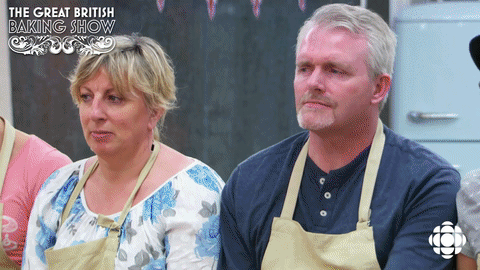
All of you charming people, put your hands down!
We have this idea that this this Was The Way It Was and it wasn’t. So, it’s just art imitating art. I find it boring. And harmful. Boring because it means we’re just telling the same story someone else told us. Harmful because it creates a narrative of acceptance. When we see things over and over, we begin to think of them as more truthful–it’s how propaganda works, for example.
What do we normalize when we retell this same story over and over?
Do we today find legal age to remove all suspicion from a relationship? If a 50 year old person is hanging around the sorts of college bars that don’t require ID, looking for hook ups, are we all like “welp. Can’t be arrested. Blessings on you both.”
I’m sure not. My friends and I, when it happened to us, sure weren’t. And yet it’s still fairly accepted behavior, right? “Oh, them.” *eyeroll* “Just chasing what they can’t get.” Where the “things they can’t get” are people who look like minors but won’t bring about the same consequences as someone who was only a few months or days younger? Are we really sure that legality is the benchmark we use to condone all behavior?
I feel very strongly that legal is not the same as moral. Legal is, and has always been (with a few reactionary exceptions), the absolute bare minimum. Think about it. Who makes laws? Why do they make laws? Whose interests are always protected–the people with lesser authority? Or the powerful folks who want to have what they want?
So that’s not an excuse, for me. The law sets a low bar to protect those in power to the exact extent that those protections will not cause the general populace to revolt. Age of consent has at most been viewed the same as it is now, where we say to the would-be victims “grow up fast, because someone’s going to make a decision for you if you don’t, and you’ll have to deal with the consequences.” All, of course, while doing nothing more than shake our heads and purse our lips at the adult who knows better than this. And, for comparison, even though 12 was the age of consent in “medieval” times for women (and 14 for boys! Now, isn’t that interesting…) marriage age was still another 8-12 years out in the future. Even in those benighted ages when things were so different, age of consent still did not mean socially accepted norm.
Okay, age of consent laws don’t mean moral acceptance by society at large. Remind me again, why are we telling these stories?
I think it’s the same reason we make laws–because there’s power in it. We’ve fetishized the exceptions, or use them to show how vile someone is, wielding the power of disgust to tell a story for us. But the problem is, aside from emphasizing the power imbalance and how commonly it occurs, it then also serves to mask the people who would actually act on these fetishes, or as we often like to call them, abusers.
When we perpetuate the idea that there’s no way men could control themselves around pubescent girls, that it’s hot when older women agree to sex with a boy, when we normalize the myth that grown adults can’t tell the difference between a child and an adult, we give abusers a cultural out. We teach younger people that it’s fine for adults to get grabby–that it was a mistake because the minors looked so mature, or if not a mistake, then “just the way it is.”
Some things we can’t change. But we can learn and grow from those things. We can’t tell nobility long dead that it’s really unhealthy, just in a purely biological sense, to have kids at 14. We can, however, realize that now and work to fix the perception of the feasibility (and agreeableness) of that act in our writing.
It’s weird for me to see grown people in modern books attracted to people clearly considered very young. Noticing someone’s pretty? Sure, having eyes isn’t bad. But seeing a life or at least a night with them? Who sees a 14 year old and doesn’t know they’re not 30? Even in a hard life, they wouldn’t look like a 30 year old. And unless they’ve had a horribly abusive life, they certainly wouldn’t sound 30.
Now, there’s some room for maneuvering, and exceptions and whatall. But not as the standard. Not as the sign of the times. Not as the basis of a myth we’ve created for ourselves.
I think we can do better. Does it need to kill a book? No. But like with trauma, culturally sensitive things should be handled, well, sensitively. I’d like us all to examine what it is we seek to accomplish with characters that look half the age of their hopeful-lovers, and ask if there’s enough in that goal to warrant the potential harm in teaching children who read these stories that adults can’t be held responsible for romantically treating minors like adults, and in immunizing adults from the things we as society know to be inappropriate, regardless of what the laws say.
If we’re imagining worlds to take us away from this one, let’s not forget to evaluate what we think our new-version of humans would find acceptable for their partnering, and if we can’t imagine it for ourselves, let’s at least use something other than exceptional historical circumstances guide us. Some people juggle geese. But most people marry someone around their age or experience level, and that age is well after puberty strikes.
[image error]
September 9, 2018
Where Did Summer Go?
I made my first soup of the season yesterday. Kids are back in school now and we’ve started planning fall activities.
So now it’s time to write again!
I think it’s some sort of residual reaction to the school year. My body knows this is the time when books should be open and homework should be due. I don’t have that (mwahaha! Take that, youths!) so instead it’s back to writing.
Expect more substantive posts soon. I’ve been working on a few meatier essays and they’re important ones to get correct. And when the sun is shining and the cicadas are humming, I have a hard time putting all my thought into something. Now that summer is leaving, I can think again.
Oh, shit. Summer. Where did I leave her, again?
Oh, no.



September 3, 2018
No Book News, Only Baked Goods
This week’s post is a little late, but I have a great excuse.
I was reading.
It’s also fairly late the day afterwards–Happy Labor Day, Americans!–so instead of any sort of book related news, I am going to talk to you about cooking for folks who don’t eat gluten.
I’m not sure if I’ve mentioned, but in my extended friend group we have folks with the following food restrictions:
-vegetarian
-dairy free
-gluten free
-kosher
-nightshade allergies
-berry allergies
-diabetes
-nut allergies
-MSG allergies
-no beef or fish
-no cilantro
I’m sure I’m forgetting something. But anyways, no one can eat food, and yet we all still like to get together to eat.
Hummus is a big deal for us. Everyone can eat hummus. All praise the hummus.
I think people get intimidated hearing that someone can’t eat a certain way. And it might take a bit of creativity, but it’s very doable, even if you’re planning fancy dinner parties for 20 people that require you steal containers from your guests’ houses and replace them with pine cones.
And one of the easiest of the lot is how to make everything gluten free. I won’t try to teach you everything I know about gluten free hosting today, but here’s a quick primer.
First of all, as always, it depends whether the issue is an allergy/medical condition or one of preference and gastrointestinal distress. If the former, you need to clean your kitchen and make sure your utensils haven’t touched a surface that has not been de-glutened. Celiac is a real and painful disease. While most folks are not sensitive enough that a spoon hitting a bread crumb will set them off, it’s really best not to risk it. If the latter, you don’t need to worry as much.
Next, don’t panic about what to serve. Gluten is found in wheat and wheat byproducts, which really means, by and large, it’s just bready things and pasta that’s off the table–though there are gluten free options for those, too! Potatoes and rice are usually gluten free (unless you’re getting some sort of mix). It’s really easy these days to tell if something is gluten free! It usually says right on the packaging or bottle, and if not, you’re looking for “wheat” in the ingredient list. If it doesn’t have wheat, you should be okay. A tricky one, for example, is soy sauce. Most soy sauce is not gluten free. Check marinades and French fries, too.
Hint: Ore Ida fries, unless it actually says “battered,” are gluten free. La Choy soy sauce is all gluten free.
And that’s really it! Things have come a long way in the gluten free world, let me tell ya. It’s so much easier now to find crackers, dips, marinades, pancake mixes and so on that take the guess work out. No more need to buy 30 flours to make a cake.
Speaking of cake, here are my favorite brands for out of the box desserts!
Cake mix: Wegman’s brand is really good, if you have a Wegman’s. Otherwise, King Arthur Gluten Free cake mix is my favorite. It requires a lot of egg and oil, but it tastes and feels the most like glutenous cake.
Cookie mix: Betty Crocker brand came out swinging with this. It’s the closest I’ve found in a box to the consistency I like in cookies (a little crunch, a little soft). The trick is, move the cookies one by one to a platter, and then let them cool about 3 minutes. Otherwise, they start to crumble before they solidify.
Brownie mix: Hands down, Krusteaz. You can’t tell they’re gluten free. It’s delicious. Krusteaz also makes a good corn bread. Pro tip, I add a 1/4 cup of gluten free all-purpose flour, a pinch of baking powder and a little extra salt to the mix and it tastes like the real thing.
If you’re not just hosting someone with celiac occasionally, a baking mix of flour is good to have on hand. They’re all pretty good these days, but I prefer Pamela’s baking mix, or, if your store doesn’t have that (it’s usually found on Amazon) then the King Arthur mix has less of the rye after taste that some have. Can’t go wrong with Bob’s Red Mill–the one-to-one flour is very easy to work with, and tastes fine.
And there you go! Keep your friends safe and impressed when they announce to you they’re gluten free. It’s not nearly as hard or expensive as it sounds. Good luck! What are some other things you want to know or your favorite gluten free mixes?
August 26, 2018
An Excess of Moderation
As you may know from my *ahem* discreet, completely modest, not at all obsessive hints, another activity I engage in is moderating a genre fiction group on Goodreads. People have been saying nice things about the group lately, and I’m quite proud (discreetly and modestly, of course) of the community we’re building, the books we’re exploring, and the discussions those books foster. So, while I gear up for the marathon of the last chapter of the third book, here’s my rules for moderating.
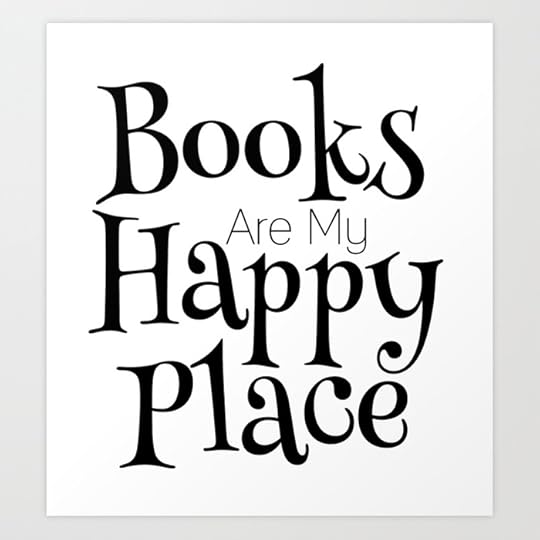
By society6.com
1. Everyone should feel valued.
Often the internet feels like shouting into the void. I never want anyone in my group to feel that way. All new members who announce themselves should be welcomed, individually, by name. While all members who participate in conversation should feel like they’ve been heard and considered, particularly those comments made by people who are new, less talkative, or who share sensitive things with the group should be addressed and encouraged or validated, as makes sense. Call backs to previous conversations, especially with people who’ve expressed uncommon views, marginalized identities, or personal truths should be done whenever possible to remind people that they are heard, their stories matter, and here they are friends. If I respond to something and there are other comments between that post and my own, I’ll make sure to say something about each so they don’t feel overlooked. Efforts are made to ensure that our bookshelf and conversations reflect every sort of person we hope to see in group.
2. Everything should be read in the kindest way possible.
Our group is global, which means that oftentimes we do not all share one culture. Language, humor, formality, views on religion etc. are not all shared, which can make tone difficult to parse. I attempt to read everything posted with the thought that it was said with good intentions and all due respect. I am not perfect, but it’s something I try. And if I fail, I attempt to make a response that assumes the best but requires clarification. When it is my word choice that is not understood or is accidentally offensive, I apologize, and do my best to make it better going forward. The other moderator and I often run things by each other first, to make sure it’s read as intended, and that our reactions aren’t triggered responses.
3. Inclusion means setting expectations and boundaries.
When I see conversations begin to veer into territory that might not make others feel safe or welcomed, I attempt to realign the thread then, rather than wait for the words to be said. Apologies are beautiful and necessary, but words can hurt forever. I’d rather send a polite reminder before the words are out there than attempt damage control after the fact. If the hint doesn’t work and words that can harm are said, then the actual behavior that caused harm is addressed, the course of action I’ve taken or would like to see taken is explained, and I express gratitude for behavior that has been corrected. Correction shouldn’t be a production, but at the same time, if there is conflict beyond disagreement about choices, that conflict is with me on top of whomever else is involved. I am a big sister, and all people, regardless of age or family status, become my younger sibling when they are welcomed into a space I help maintain. I will not hurt them with silence when direct, respectful action can be taken instead. Everyone is assumed to have agency, but no one else in groups I host is required to take the burden of education or anger–and certainly never alone.
4. Be consistent with rules and expectations
My group has a published set of rules for how our month works, what works are allowed for selection, a harassment policy, how authors and other professionals may interact with the group, and how on topic threads have to be. There are 21,000 people in the group at the time of this post. Rules are how we all get to feel heard, safe, and appreciated. I know it gets irritating when a perfectly good conversation gets nudged back on topic, but it’s that or never be able to find conversations again. I know authors wish they could mention writing wherever, but it’s not a group for authors, it’s a group for readers. Their comfort comes first. And, it should be said, while I am still human, this reasoning applies to most endeavors. Beyond a few viewpoints I cannot tolerate for the sake of us all, (such as ideas that support genocide) the rules of the group apply to everyone. Again, this is something the other moderator and I work on together to ensure that we’re providing clear, useful feedback and that the group is seeing us demonstrate the behavior we anticipate.
5. Build community
Speculative fiction is all about the heights and depths of human achievement. It’s about pushing beyond the status quo, overcoming, and the heart that compels us to those achievements. With that as a common language, it should be easy to share compassion among our members. I strive to make connections between people. Silly posts, discussions of what we do outside of our literary lives, buddy reads, requests for reading ideas, meet ups…all of this gives people safe, fun ways to express themselves and receive support. Raising each other’s voices and sharing in someone’s life, no matter how briefly, is a wonderful thing that should be celebrated and encouraged.
There’s a lot of great information out there on creating safe and/or creative spaces in education and the gaming industry. As these are sort of the burgeoning space for discussions of safety and inclusivity, as well as areas where belonging can be crucial, it makes sense that a lot of effort is being made there to live up to that need. Inclusive game designers, con organizers and teachers have a lot to say on this topic, and I heartily recommend everyone give it a look, even if games or pedagogy aren’t your thing. I use this all the time as a host in my home, a lawyer counseling clients, and, of course, as a moderator. With all of the news, the #metoo movements and the rise of more marginalized people everywhere, no one can afford to assume that everything is and will remain fine. To quote Dr. Horrible, “the status is not quo,” and anyone with a shred of authority can be part of the shift to a better world, be it within your home, your shop, your workplace or your online book club. And when people feel like they’re part of something better, they move the dial a bit towards a brighter world for all of us.
We live in the future. People are constantly in our space through our phones and computers. Let’s use that to build something more beautiful than our epics, and more perfect than science fiction has ever dreamed!
August 19, 2018
Nice Is Nothing, Good Takes Work
Writing men is an interesting part of my process–mostly because it’s so much easier to write the media stereotypes rather than men who come across like the people I see; ones just as multi-faceted and idiosyncratic as any woman character. It’s difficult, because I don’t think it’s general knowledge yet that there’s no one way to be a “real man.” A few seem to be trying it, but it’s a subtle rebranding of what feminists have been yelling for the past decade or so, a still-aggressive posturing that proclaims that this man knows he’s masculine and if you have anything to say about his knitting project, well, he has two mini-stiletto blades and a yarn garrote ready to go.
**CONTENT WARNING** discussion of rape culture follows.
This has initiated many conversations, not just about the inner life of men that I think is missing from testosterone-fueled action books on the market, but about the delicate balance between men and women in real life, too, and whether we believe violence to be an inescapable instinct or a base response that can and should be trained towards more socially acceptable behavior.
This then often leads to questions about how to be a better ally, how to befriend or pursue a woman without making that pursuit feel like a hunt for prey.
I don’t generally subscribe to the “men are from Mars, women are from Venus” bullshit. I usually find it to be a trite way of excusing the bad behavior of some men and putting women on an inescapable pedestal with the other perfect beauties of Grace and Goodness known best for their rapes.
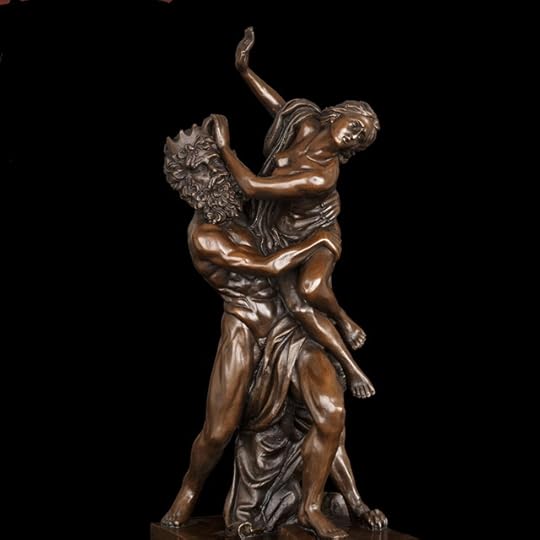
The Rape of Proserpina
I ain’t here for that.
We live on Earth, together, and we have to deal with it. Which means that though I despise the idea that men* are vile, animistic rapists looking for weak prey, and believe that it’s unjust to men and an unwholesome expectation to give boys to assume this, I’m still on Earth. I don’t have any mental powers to inform me of your intentions, and I can’t take that chance with every person. I’ve been prey, thanks, and it’s not flattering, or romantic, or funny. It’s very scary, it’s humiliating, and it makes women feel worthless.
Look, we can’t avoid it. Whether it’s the nature of the beast or the tricks we taught the beast, here we are. Even in my towering rage, even after three years of weight lifting, I can’t do the same amount of harm with my bare hands to the average male that he can do to me. Even at my most paranoid, I can’t stop a determined person from crossing my boundaries. And the people most likely to boundary cross are men. Statistically, these are just plain truths.
So this is for the nice guys who really don’t want to be treated like predators, and to the women who keep ending up with their boundaries crossed.
I get it, guys, you’ve been told likely your whole life that women are mysterious creatures whose words often mean the opposite of what they sound like. Hell, you’ve been told to shut down your own emotions and self exploration to the point that I bet over half of you can’t tell when you’re mildly injured, or are about to faint from low blood sugar or the possibility that there’s a difference between wanting a hug and wanting a lay.
That fucking sucks. I’m sorry. So here are some suggestions in plain English to consider in common scenarios.
Scenario 1: It’s true, the only self-reflection I engage in is whether I’m seen as masculine.
Well, hey, recognizing that is something. That really blows–that’s a really toxic headspace, when smelling clean or knowing how to feed yourself make you question your social value. As a woman, let me tell you that taking care of yourself is very masculine. Please push back on the notion that there’s a specific way to be a man and that anger is part of that. Confidence and loving yourself are highly desirable traits, and much much healthier for you!
Worst response: Do nothing. Stay in the discomfort of self-doubt.
Better response: Take pride in what you love and do it regardless of whether it fits in a box. Share that love widely and build connections based on that love.
Best response: Go talk to a professional.

Seriously. If you’ve found yourself only using the L word during sex, or only talk about your feelings with a woman who seems nurturing, please go pay someone to help. You deserve to know you. And equally importantly, the person you trust or love deserves to have someone with emotional intelligence who does not require a mommy/daddy figure for their emotional well-being. Women in particular often put a lot of effort into being desirable, from the cosmetic to the personality conditioning. If we can pull the hairs out of our flesh and get over the guy who attacked us as a teenager to be with you, the least you can do is put in a couple sessions in the emotional gym.
Scenario 2: I am around an unknown woman in a public space without others present.
I’m not talking about walking down the street at rush hour. This is for walking down a deserted street, particularly at night, or down a narrow aisle with limited visibility, elevators, relatively empty train cars (or if there is only one or two women present in the midst of many more men) and other such scenarios that might read as threatening.
Worst response: Try to ease her with lots of talking and eye contact. When I moved to Philly, even people saying “good morning” with their hands in their pockets made me grab my pepper spray. If you’re a friendly sort, or in some place known to be friendly, like a neighborhood, keep it to a brief pleasantry and briefer eye contact before moving forward.
Better response: Try to make yourself physically less imposing and ignore her after enough eye contact to recognize she’s there. Hands in pockets. Walk as far away on the sidewalk as you can get. Angle yourself so she doesn’t have to touch you to get around you. Don’t turn back once you pass. Keep your eyes on her eyes or your path.
Best response: Get out of her space.

It’s so scary when you are trying to decide if it’s worse to turn back or keep going.
Cross the street. Stop in a store and wait for her to be gone. Take the next elevator. Move down a few seats. If, worst of all, you find yourself behind her for more than a block with no one else around, stop and fake a phone call until there’s room between you. You have to understand, it’s almost guaranteed she’s been followed or groped in passing. It’s not enough not to do that. If you want to put her at ease, you need to actively remove the source of her potential fear, which is, in this case, you. I’m sorry. I’m sure you’d never do anything to hurt her, but she can’t know that. She thought the last guy who hurt her wouldn’t either. So be a good guy and remove that whole source of tension.
This can be seen as a bit of an extreme response to something as mundane as walking down a street, and sometimes isn’t viable. That’s okay, if it feels unnatural, the “better” response is still helpful. However, if you have the option, and it is your intent to make people feel entirely un-threatened, this response will achieve that most handily. And yes, many women can handle themselves or don’t want to be treated as victims. We still can’t know that without some sort of conversation. As this is not the time for that, doing your best to seem non-threatening is still the safest option for everyone.
Scenario 3. I am around a woman in a confined or intimate space.
Unfortunately, it matters very little if you’re friends or strangers in this scenario; the same rules apply. Trust to exist within someone’s personal space can only be earned, never assumed, and should only be sought if you know you can maintain that trust without fail.
Worst response: Pay no attention to your body or its position, filling the space. This is a form of social dominance and it is obvious to those around you. It is physically intimidating.

Better response: Actively ensure you’re not blocking exits with your body (as much as possible) and that you’re not taking up more than the space available to you. Ex. half a bench if you’re the only two on it, or shoulder width if there’s more than the two of you.
Best response: Mitigate the difference in your situations.
Sit. Sit down so you’re closer to equal height-wise. Keep yourself out of the path of the exit. Put a social amount of distance (18 to 36 inches) between you if possible, or at least take up no more room than you can avoid using. This is a time when body language is really important, too. It’s okay to notice people around you. If a woman is squashed in a corner, or is leaning away from you noticeably, take the hint and do your best to reposition.
Scenario 4: I am attracted to women and want to express interest in a particular woman.
Worst case: Touch her without permission, make sexually explicit jokes, badger her for her number (including not leaving her until she’s added it to your phone) and generally pushing the issue until she has to verbally reject you and/or leave the establishment entirely to be rid of you.
Better response: Ask her about herself and leave off the propositions until the end of the conversation.
Best response: Give her as many outs as possible.
Again, watch to ensure you’re not trapping her physically. Ask one question (other than “is this seat taken”). If she doesn’t respond with a question of her own, you can assume the conversation is over and you’ve just been gently rejected. Watch body language. If she’s not focusing on you, or is leaning away, fidgeting with her phone or purse, or trying to do things like go back to reading her book or scrolling Facebook, you’ve been benched. Don’t make her say it.
And for the love of God, don’t talk about her, let her talk for herself. Only jump in where it makes sense, like when you can add to what she said or give an anecdote that shows how similar you are. Dating is a conversation, not a monologue. Listening is damn sexy. This is true in person and in online dating. Talk about a thing she’s already expressed interest in. Show how you add value, rather than trying to diminish the value of things she cares about.
Bonus advice. You need to have a current photo of yourself on your dating profile. Go outside, take a nice picture of yourself fully clothed and smiling, and post it. Not only does it make you seem less homicidal than the person with a fish, tiger, or scratched out ex as a profile pic, but if you’re asking her to go some place to be with you, she needs to be able to tell her friends what you look like in case she doesn’t come home. Again, not because you would do anything, but it’s polite to show that you’re not trying to be sneaky about your intentions. Yes, this is honestly what she’s thinking. We routinely show each other profile pics and share our location with a group of close friends in case we don’t make it home. This is worth a selfie, my guy.
Scenario 5: I’d like to pay a compliment to someone who is not my partner.
Worst response: Make it about her physical qualities, like her figure, especially when it revolves around other cultural indicators, such as skin tone, hair curl, or religious markers.
Better response: Tell her you like her choices, such as a hairstyle or piece of jewelry.
Best response: Imagine she’s expecting a pick up line to follow and avoid the punchline.
Let me ‘splain. “I like your dress,” is not a threatening compliment. That’s fine. But what she’s afraid you’re thinking (or about to say) is “…but I bet it’d look better on my floor.”
Instead, try taking yourself out of the sentence. “That’s a pretty dress.” “You look very nice.” “Great earrings.” I don’t care if you actually mean “ass” when you say “dress” or “smoking hot” when you said “very nice.” She probably knows, too. But it’s nice that you’re making an effort. Also remember that complimenting people is done for the intent of making them feel good. They do not owe you anything in return. If she would like to initiate a conversation afterwards, she will do so. Otherwise, be pleased that you said something kind and leave it be.
Do not comment on weight unless you are extremely close and/or it’s been made clear that she’s actively trying to lose weight. And then focus on the things other than her measurements. “It looks like you’ve been working really hard!” or “Wow, you’re looking stronger!” Remember, too, that there are very unhealthy ways to lose weight, so if you’re not seeing muscle tone and shiny hair, or if there was no mention of wanting to lose weight, maybe stick to questions if you’re close enough to address it at all. “Are you feeling stronger?” “Are you being healthy?” If you want to ask out of concern, avoid making judgments, and be ready for an uncomfortable conversation.
Scenario 6: I want to talk about something without sounding patronizing/like I’m “mansplaining.”
I’m not going to explain this again, I’m going to defer to a woman with much better flowcharting skills than I have.

by Kim Goodwin
I will add, however, that this one gets easier if you practice a few handy phrases. “Correct me if I’m wrong…” “I’m just talking out loud here, jump in if you know this.” Also note that folks know that not everyone is going to be socially aware all the time, so again practice noticing body language. Is she pissed? Mouth tight, flat expression, arms crossed, body either leaning away or clenched tight? Yeah, that all means she’s pissed. You should stop talking. Not pissed? Maybe ask if you should keep talking.
Bonus points: Highlight what she has said. Repeat smart responses and credit them to the women who say them in meetings. (I mean, do this to all people, but really pay attention if it’s a woman, as there’s a lot of bull about how often we’re taken seriously.)
Scenario 7: I believe I see a woman in distress.
This is actually useful for all tense social situations. The distress I’m talking about is a woman who looks uncomfortable, is being actively threatened by someone or seems scared.
Worst response: Ride in like the white knight.
You have no idea what you’re interrupting or what will happen after you leave. You are putting her in danger if you escalate the situation.
Better response: Stick around. Just hang out, ready to call the cops, flag a manager or other person who can help create a diversion or escape route, or intercede if it turns violent and you’re comfortable wading into violence. It’s okay not to do that, though. Drawing attention at all is better than nothing.
Best response: Talk to her neutrally.
“Miss, are you okay? Would you like assistance?” Assuming she’s distressed, not having a physical emergency, she can use her words. “Is this man bothering you?”
This does two things. It allows her to choose her response without worrying about the motives of a seemingly bigger threat (yeah, even helpful strangers yelling and puffing up is scary) and keeps the situation from escalating because the other person is feeling defensive. They are effectively removed from the conversation, and the focus is back where it rightly belongs–on the person potentially being harmed.
I have a blog post already up about what to do when you do intercede, that you should check out! In the meantime, remember that being willing to help is awesome, but sometimes they’re not in a position to accept your help. You tried. Sometimes that’s the best we can do.
Bonus points: When someone is sharing things they’ve experienced, do everything you can not to put your own feelings in there. If a woman friend is telling you about the assault she experienced, keep your apologies and anger to a minimum, because it’s hard sharing things, and while it feels good to be validated, it’s a lot of effort to soothe someone else about the hurt you endured. The model we strive for is “support in, vent out.” Listen, ask how you can help, research on your own how you can help, treat it seriously but not like it changes anything for you, because why should it? If you would act differently with the knowledge that your close friends have been hurt, make those corrections right now. They have been hurt. And, if you’re struggling with feelings you can’t keep to yourself, don’t turn to the person who just confided in you, go to someone else. Talk to a trusted friend, mutual or otherwise, or a professional counselor about what it is going through your head and how to handle it.
I hope this is helpful. If every man I’ve encountered who didn’t want to cause me harm had done this, I think the world would be a much friendlier place, and certainly a safer one. I hope also this has caused some to think about how we interact and what social outcomes we’re striving to achieve. I’d like to add that I know some of this might cause some negative reactions, perhaps defensiveness or outrage. First, let me say that I know it’s not only men who can be predators, and we need to address that. My hope is to make guidelines that allow people to more readily see predators of all genders, and to start a conversation about how we can all improve our physical awareness and emotional intelligence. Secondly, if you’re feeling defensive, I’d urge you to try some of these techniques right now! Talk to a friend you trust and work through how you can approach these situations. Engage, don’t dismiss! I know we can do better. If these situations don’t help you personally, what are some other questions or advice you have for people who want to have more successful interactions?
*I am largely addressing cis-men in this post, though I think it can be applicable to anyone who presents masculine.
August 12, 2018
Kidnapped But Don’t Worry
I was kidnapped today! I was told to get a little dressy and then to get in a car, which then took me to a place where other people jumped in the car and then we fled to Jersey.
I mean, all the people in the car were family, so I wasn’t that pressed about it, but I can’t say heading over the river didn’t make me a wee bit nervous. Mostly because have you seen how people drive on the Turnpike? It might as well be a challenge in the Tri-Wizard Tournament, driving up the corridor.
But then we got on a train and I knew we were heading to THE CITY.
I have to all caps it because for me The City is my city, Philly. But New York gotta be extra ’bout everything, big letters, making everyone call it THE CITY no matter how many cities between it and you.
I was brought a little uptown towards Central Park and then we rounded the corner to The Tavern on the Green, which is a simultaneously adorable and enormous restaurant right in the Park. I thought that was a little bit of a hike for brunch, even if it was a fun one, and then we go inside…
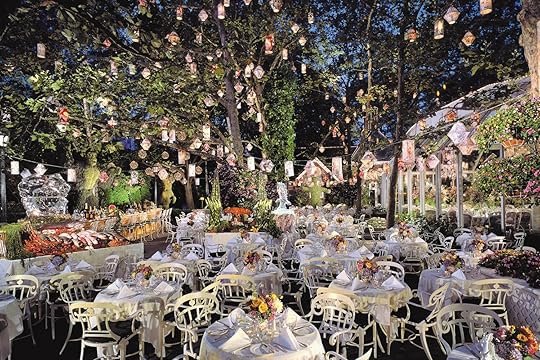
It’s weird how no one was there and it was dark at noon, though.
My parents were there, too! The whole famn damily for a beautiful, boozy brunch with a slight breeze and live jazz in the background. It was absolutely lovely.
And I’m home! So I might have a little difficulty convincing the cops to take my kidnapping seriously. I’ll keep you posted.
Meanwhile, what all this means for y’all is that my scheduled posts are getting pushed back a bit. Chill out, have a mimosa and some pastry, man. Go pet a dog. It’s fine.




